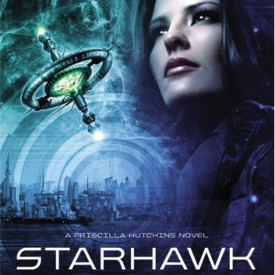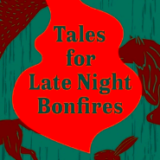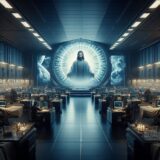It’s flaws are clearly in evidence, to be fair. The special effects – very good for their day – look like a joke now, a problem made worse by the constant repetition of the same scenes time and time again. (That poor Cylon Raider has been blown away countless times.) The remake has a grittiness that the original lacks, although there are some moments where the original actually has more grittiness than the remake. And some of the one-part episodes are absurd.
(Cylon Raider getting blown up in a promotional trailer.)
But its flaws are outshined by the sheer amount of work that went into the series and, in many ways, the performance of the cast.
The basic plot is simple. The Twelve Colonies of Man have been fighting the alien Cylons for over a thousand years, but they are tiring of war. When the Cylons, working through Commander Baltar (it’s not actually clear if Baltar was ever actually in the military, although one hopes not), offer peace talks, the Twelve Colonies dispatches most of its fleet to the planned conference. Unluckily for them, it’s a trap – the fleet is wiped out, save for a lone Battlestar (Galactica) and the Twelve Colonies are smashed. Humanity is on the verge of total extinction.
But there is hope. There is a Thirteenth colony, Earth. Led by Galactica, a fleet of rag-tag starships sets out to find the missing colony. But the Cylons are in hot pursuit.
Why do I like it? Well …
It’s simplistic, but largely accurate, to say that the two-part episodes were vastly superior to the one-part shows. The two-part episodes give the story time to build and grow, something that was often missing from the remake. While the series didn’t follow a real arc, one story often built on another. They also tended to ask questions that needed to be raised. When a long-lost military hero is discovered (along with his Battlestar), should the refugees join him in taking the war to the enemy or keep fleeing? There is a genuine question here, one lacking from the remake. Commander Cain is likable in a way Admiral Cain is not. Nor is he portrayed as a villain, even though he’s clearly in the wrong.
Battlestar did it’s level best to depict a society that was different from ours, even though it had points in common. Everything from the ranks and uniforms to the games and terminology smacked of an alternate universe, not men and women who could have walked off a modern day aircraft carrier. It wasn’t that far from America, I admit, but it was different – again, unlike the remake. It’s really a pity they didn’t put quite so much thought into their FTL drive concepts, as the exact nature of ‘light-speed’ is never really addressed.
Like most other shows from that era, Battlestar needed a good cast – the special effects could not carry the show by themselves. And Battlestar had some very good characters – Commander Adama, Apollo, Starbuck, Tigh and Boomer … and, on the other side, Baltar and Count Iblis. (Notably, Baltar was originally executed by the Cylons after betraying the Twelve Colonies, but he was later brought back because they needed someone as the face of the enemy, a problem the remake sought to solve with ‘skin-jobs.’)
Remarkably, for its time, the series was racially integrated. Colonel Tigh and Boomer – both black – hold down their roles and no one seems to find it odd. Boomer is just another pilot, while no one raises any complaints when Tigh takes command of the Galactica in one episode. It’s generally clear that both of them are liked as well as respected.
The same couldn’t be said of its female characters. Battlestar struggled to find a female lead – Athena’s actress was poor, while Serina was killed off fairly early on. Sheba, after her introduction, did rise to the challenge, but by then the series was drawing to a close. The female redshirts were selected more for fan service than anything else, although it was nice to see women flying fighters and generally serving alongside the men.
The show – much like its successor – often forced its characters to grapple with hard choices, although the terms were often different. In War of the Gods, the fleet encounters an entity – Count Iblis – who offers them everything they want, in exchange for following him. But Iblis is not what he seems and the bargain he offers is literally satanic. In The Gun on Ice Planet Zero, the fleet is forced to rely on criminals to take out the enemy weapon before it can do the same to Galactica. And in both The Living Legend and The Hand of God, the fleet must decide between trying to take the offensive or staying on the run.
Indeed, in many ways, The Hand of God – the final episode – is the greatest, because it showcases the best of Battlestar Galactica. Having stumbled across an enemy ship, Adama determines to attack … and, nothing, not even the poor SFX, can detract from the story. It’s loaded with nice moments of genuine brilliance and very few episodes from the new series match it.
And yet, many of the stand-alone episodes are very limited. Drawing too much on other TV tropes at the time – the western, most notably- they are often quite poor stories that make very little sense. The discovery of Terra – an Earth-like world in the middle of a Cold War – doesn’t fit into the series, unless you believe that Terra – and all the other human-populated worlds – are colonies that were cut off by the war. (And there’s also some fridge horror here, as the Cylons are following the fleet …) Sometimes this even spills over onto the characters, when – for example – it is painfully clear that Starbuck, not Apollo, was meant to be the lead character in a certain episode.
Even so, they do have some nice moments. Fire in Space is one of the weakest episodes, but it was nominated for an NAACP award because of the interplay between Tigh and Boomer.
In comparison to its successor, there was a genuine camaraderie between most of the lead characters. There are few interpersonal disputes on the fleet, none of which are worth mentioning. Adama and Apollo have a close relationship, Apollo and Starbuck are very close friends who will do anything for each other; there is nothing so foolish as the threatened civil war within the fleet that blighted the remake. There is something healthy about the first version that is lacking in the second.
Nor is there anyone as wishy-washy and plain irritating as the remade Baltar. On the other hand, the absence of a lead character from the Council of Twelve is a problem – the council seems to vary wildly in competence, depending on the needs of the plot.
Frustratingly, the series never came to a real conclusion. (Galactica 1980 did not happen. Full stop.) A number of mysteries remain unsolved, barring a better remake. And yet, like I said, we get enough nice moments to fill in the blanks. Count Iblis is played by the same actor who voiced the Cylon Imperious Leader and Balter recognises his voice. (As one fan site put it, failing to recognise the voice would have been an unforgivable flub.) What role did he play in starting the war?
More notably, the view of the war itself has changed. The classic series says that the Twelve Colonies joined the war to save another race – an alien race, one assumes – that was on the verge of being slaughtered by the Cylons. Joining the war is thus presented as a good and noble deed, not unlike America joining the First and Second World Wars. By contrast, the remake blames humanity for creating and enslaving the Cylons, thus providing a justification for the Cylon jihad against mankind. This is not an improvement. On one hand, I’m sick of seeing the West (or stand-ins) blamed for wars; on the other, abuse does not justify mass slaughter and attempted genocide. I can understand why a teenage boy who gets bullied might blame everyone at his school, even the people who didn’t take part in the bullying, but I cannot condone him finding a weapon, taking it to his school and opening fire.
Classic Battlestar tells us that there are some enemies who simply have to be fought. The remake tells us that it’s all our own stupid fault.
It’s easy to mock a series that was put into production well before SFX became truly brilliant; Doctor Who, Star Trek and Blake’s Seven all had crappy SFX by our standards. And yet, the poor SFX forced the writers to actually concentrate on writing good scripts! Viewers came for the stories, not for the special effects. Is it a coincidence, perhaps, that Star Trek’s storytelling declined – Voyager, Enterprise, nu-Kirk – as the SPX got even better?
But the classic Battlestar Galactica spoke timeless truths. War may be hell, but surrender or utter destruction is worse; peace is desirable, but not at the price of freedom. And don’t let your desire for peace overwhelm your common sense.
Overall, the series deserves to be remembered. And, as the remake started to fall apart under its own weight, I remembered why I liked the original in the first place.











This is a great review of the original series. I like it a lot and wished ABC had stayed the course. One can hope that they’ll redo this series again, more in the spirit of the original than the remake.
Apple TV has it on their roster (most likely 2019) as well as the Amazing Stories tv show revamp…